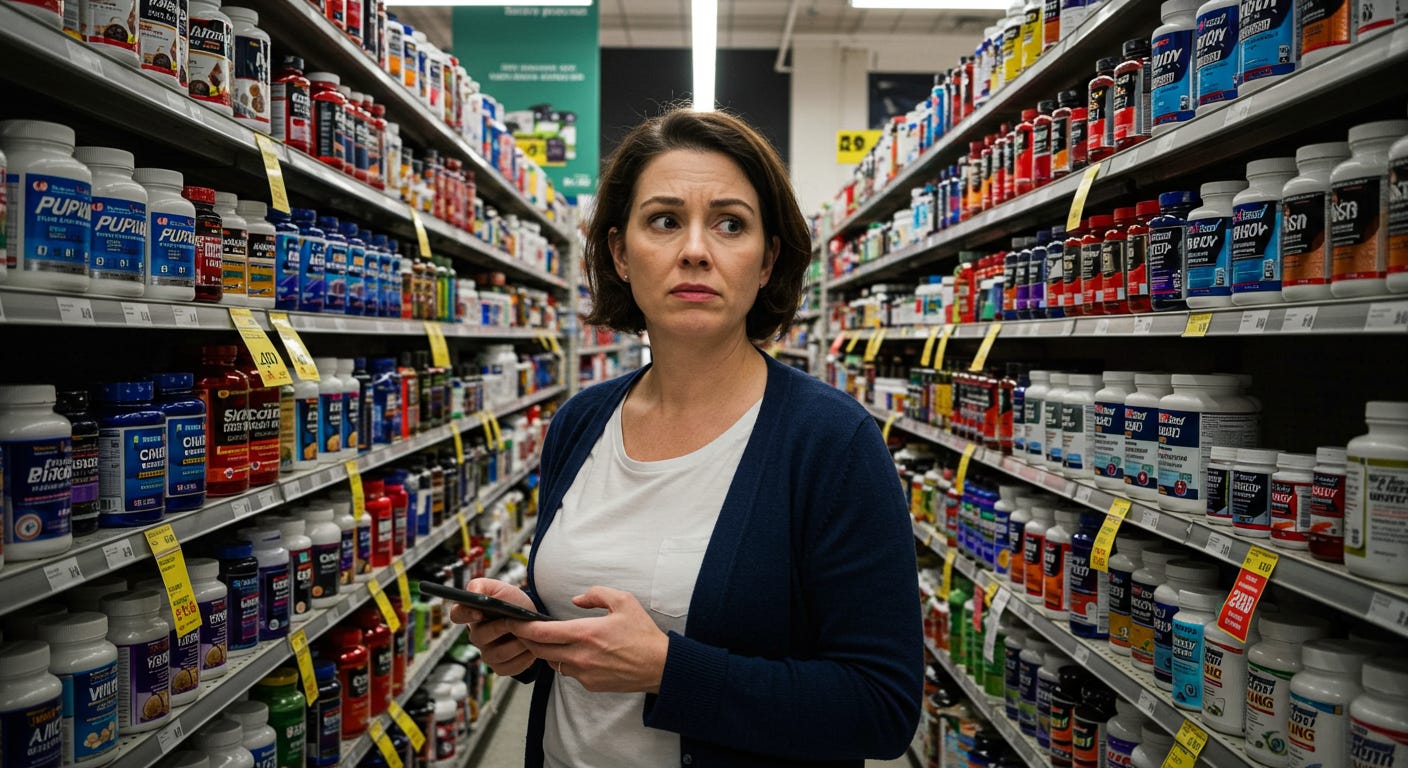Issue #9 · April 9, 2025 · 4 min read
Last week I wrote about the Explorer archetype and the human drive for discovery.
This week, my mind has been elsewhere. Specifically about 30 centimetres south of my brain in my stomach.
I was walking through Chemist Warehouse last weekend, fluorescent lights buzzing, staring at the overwhelming wall of supplements.
Over 1,000 different bottles, pills, powders and gummies lined the shelves, each promising some kind of health miracle.
Late last year I was struggling with feeling off, exhaustion, and bloating.
I couldn't concentrate and my work suffered.
I felt like I was moving through life with a thick wool blanket wrapped around my head.
My blood tests showed low B12, low vitamin D, and high homocysteine levels.
My integrated GP considered it may be malabsorption.
After a comprehensive gut screening it was revealed I had Small Intestinal Bacterial Overgrowth (SIBO).
When that got treated, it was like someone had finally lifted that wool blanket.
My thinking cleared. My energy came back.
It was one of those profound moments that changes how you view yourself. I realised how deeply my brain function depended on what was happening in my gut.
I have previously seen a Nutritionist and Naturopath with the intention of better food habits. But when the weekend comes around I often give in to temptation for a sweet treat or an easy meal out.
Now realising that likely those high sugar and low nutrient meals were feeding a harmful kind of bacteria and that was the real reason I woke up feeling crappy on Monday (probably the beer too).
This personal experience is why I've been following the emerging research on psychobiotics with such interest. And why I think it could be a booming industry to watch out for.
The Gut-Brain Highway
The supplement industry in Australia is expected to top $5.2 billion by 2030, with mood and relaxation supplements being one of the largest categories.
But among this crowded field, psychobiotics are particularly fascinating.
Psychobiotics are essentially probiotics that, when consumed, may influence mental health through the gut-brain axis.
If you haven't heard this term yet, you likely will soon. Google Trends data shows search interest has been steadily increasing for the past 5 years.
Think of your gut-brain connection like a busy two-way highway. Traffic flows constantly in both directions, carrying important chemical and neural messages that affect everything from basic digestion to complex emotions.
Your enteric nervous system - often called your second brain - contains over 100 million neurons lining your digestive tract. Which is more neurons than in your spinal cord.
The research is showing that up to 90% of your body's serotonin (that crucial feel good chemical) is actually produced in your gut.
It challenges the traditional notion that mental health issues are caused by chemical imbalances in the brain, and instead supporting that it may have more to do with our microbes.
The science around this made some really exciting leaps forward this past year.
Researchers at Duke-NUS Medical School discovered certain substances produced by gut bacteria (called indoles) directly affect the part of our brain that handles fear and anxiety.
They found that mice without any gut bacteria showed much more anxious behaviour than normal. When they gave these mice either the right bacteria or just the compounds these bacteria produce, their anxiety behaviours disappeared.
In another study from this February a specific probiotic LGG is showing strong potential for improving mental health.
The study compared LGG to common antidepressant medications like bupropion and venlafaxine, finding that the probiotic was actually more effective at reducing depressive behaviours in mice.
The current evidence in human trials to support generalised claims that probiotics improve mental health is limited.
But it’s clear that what we eat affects which bacteria grow in our gut, and those bacteria can produce substances that directly impact our mental state.
What's Available now?
The Australian market for psychobiotics is taking its first steps, with some products starting to appear on shelves.
Therapeutic Goods Administration classifies probiotics as complementary medicines, allowing companies to make general wellbeing claims (e.g. helps maintain general health & wellbeing) but will require therapeutic claims (e.g. treating anxiety) to meet stricter evidence standards.
This reflects the global pattern where probiotics occupy a middle ground between food and medicine, with disease-specific claims requiring drug-like validation.
Inner Health Plus recently launched a product called Neuro Balance Probiotic that specifically targets mental wellbeing. They claim it helps with stress response, emotional wellbeing, and mental clarity using the previously mentioned strain, LGG.
But the problem is these products aren't cheap.
Neuro Balance costs $51.95 for a month's supply. Compare that to first-line antidepressants like lexapro and sertraline, which are available as generics for just $6.90 with a prescription.
This raises interesting questions about who these products are really for.
Are people even looking to brands like Inner Health Plus for mental wellbeing support, or do most of us still see them as the funny little guy on tv.
And at these prices, are psychobiotics becoming a premium wellness product rather than an accessible mental health option?
With the market for probiotics projected to grow from $71 billion last year to $105 billion by 2029, I believe we're heading toward three key developments:
Strain-specific formulations targeting specific mental health conditions based on clinical research rather than general "mental wellbeing” claims
Direct-to-consumer microbiome testing with accompanying personalised psychobiotic recommendations
Integration with traditional mental health treatments as psychiatrists and GPs begin recognising the gut-brain connection's importance
For now, I'm approaching this field with cautious optimism.
The notion that the trillions of microorganisms in our gut might influence our thoughts, feelings, and behaviours is both humbling and empowering.
Humbling because it reminds us how interconnected our bodily systems truly are, and empowering because it opens new avenues for supporting mental wellbeing.
What about you? Have you noticed connections between your gut health and mental clarity? I'd love to hear your experiences in the comments.
More soon,
Alex
P.S. If you found this valuable, consider sharing it with someone interested in the intersection of wellbeing and emerging science. And if you're new here, subscribe to get these insights in your inbox every week.








